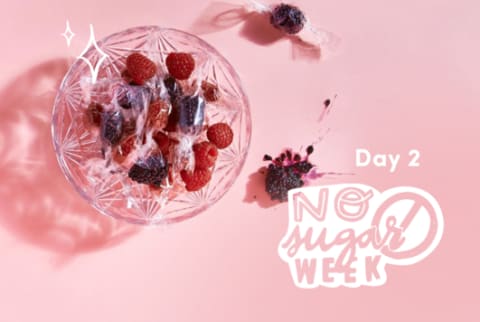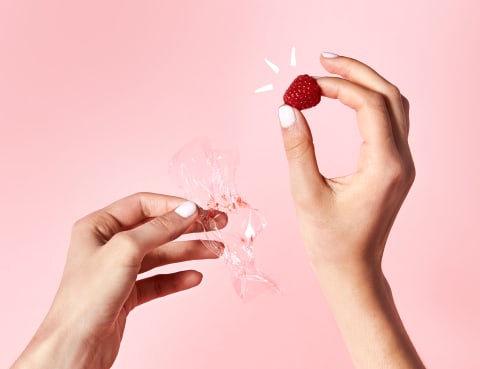Advertisement
Is Fruit Sugar Bad For You? A Doctor Explains


It’s Day 2 of mbg’s first-ever no-sugar challenge. All week long, we’ll be sharing tips, tricks, inspirational stories, and recipes to help you eliminate sugar for the week—and maybe much longer! You can check out the rules of the challenge (and the 10 best tips for eliminating sugar), try out the no-sugar smoothie supermodels are obsessed with, or head over to our Instagram account to see takeovers from some of the wellness world’s biggest celebrities. You can join them (and us!) in #mbgnosugarweek by simply cutting the sweet stuff for the next seven days. Use the hashtag #mbgnosugarweek and tag @mindbodygreen during your journey to be regrammed or even potentially see yourself on the site!
“I follow the program to a T, I’ve lost a few pounds, but lately I’ve felt terrible and the weight loss came to a standstill,” my 34-year-old patient Margaret told me during our first consultation last summer.
Among her problems, Margaret felt frequently fatigued and moody, with skin rashes that left her wearing long sleeves even in humid August Manhattan. A few tests revealed Margaret had candidiasis, or an excessive amount of the fungus Candida in her gut. While trace amounts of candida may be perfectly normal, leaky gut and many other problems result when it gets out of hand and wrecks your gut’s microbiome balance.
As a medical doctor who specializes in gut health, Margaret’s conditions left me baffled. She avoided processed foods, bypassed sugar and other candida-feeding foods, slept well, supplemented smartly, and did Barre classes regularly. Yet the scales wouldn’t move as her health deteriorated. However, I knew that in every weight-loss resistance story, the clue is in the details.
Then it hit me. “I don’t eat sugar, but I crave fruit, of all things!” she told me. “Dried ones like raisins but also juicy ones like mango and grapes.”
I started mentally connecting the dots. For the prior seven months, Margaret had followed a popular weight-loss program that assigns zero points for fruit. In other words, they claim you can eat all the fruit you want and lose weight.
One thing I’ve found in my practice: People eat more sugar than they realize, mostly from “healthy” sources like fruit.

Think about it. If you eat a piece of chocolate cake, you know it isn’t good for you. You’re going to eat it sensibly, right? But many patients consider other carbohydrates like pomegranate juice, and even vegetable/fruit juices as “healthy” without realizing how much sugar they are consuming. Unfortunately, these patients are unknowingly feeding yeast and unfriendly bacteria in their gut, then wondering why they don’t feel well and can’t lose weight.
Margaret’s diet included copious amounts of these “healthy” sugars, mostly from fruit that contained higher amounts of fructose. Guess what candida loves besides regular sugar? Yup, fructose1.
Fruits contain various amounts of two simple sugars, glucose and fructose. While pretty much all your cells can utilize glucose as fuel, only your liver can metabolize fructose. This poses a major problem when it comes to your metabolism.
Large amounts of this sugar—yes, even from “healthy” fruit— get stored as unsightly fat in the middle and result in non-alcoholic fatty liver disease (NAFLD)2, a growing epidemic and leading cause of liver failure requiring a liver transplant.
Research also shows that fructose is lipogenic and behaves more like a fat than a carbohydrate in the body. That includes the usual suspects like soda, which is riddled with high-fructose corn syrup (HFCS) consisting of 55% fructose, but also fruit juices and sweeteners. Agave, which has been marketed as a “healthy” alternative sweetener, is actually worse than HFCS, having anywhere from 55—97% fructose content.
Excessive fructose also creates advanced glycation end-products3 (appropriately called AGEs), which trigger oxidative damage, inflammation, and lots of other health-wrecking chaos that lead to cellular aging, as the name implies.
The most drastic consequences of having too much fructose in your diet is insulin resistance, where your cells can’t “hear” the call of this sugar-storing hormone; and leptin resistance, where your brain doesn’t get this hormone’s message to stop eating before you reach for seconds and thirds.
Your gut bacteria—especially the bad guys—also love fructose, gobbling it up and triggering bad bacterial overgrowth.
If you’re metabolically challenged, lower-sugar fruits like berries and avocados (yes, a fruit) are usually perfectly fine.
If you’re an athlete or otherwise-active person, even a little bit of higher-fructose fruit like grapes aren’t likely to create problems, especially in that post-workout sugar-starved recovery phase. And let’s face it, a fresh slice of cold watermelon on a hot summer day is a great way to rehydrate.
What isn’t OK for anyone is fruit juice, including those health-halo smoothies. Whole fruit comes wrapped in fiber and nutrients that somewhat buffer out its sugar load. When you juice fruit, you strip away that fiber and some of the nutrients, basically facilitating a sugar surge that beelines to your liver and creates insulin resistance.
For patients like Margaret who test positive for Candida or yeast overgrowth, I recommend massively reducing or even avoiding naturally occurring sugars, including yes, the fructose in fruit. At most, fruit intake should be limited to berries when you’re trying to lose weight, treating sweeter fruit as the occasional splurge.
I asked Margaret to eliminate fruit (fresh and dried, except a palm full of berries when she craved some sweetness) for three weeks and start her morning with my fruit-free smoothie (recipe below). She arrived in my office a month later ten pounds lighter and with a renewed vigor.
Yes, some fruit can be healthy for most people, but fructose overload results in major health havoc.
Dr. Vincent Pedre's Gut-Healing, No-Fruit Smoothie
A richly green, hydrating smoothie full of healthy fats and fiber. This fruit-free smoothie is a great go-to for overall health benefits!
Makes 2-3 cups
Ingredients
- ½ English cucumber*
- 1 ½ cups filtered water
- 1 teaspoon vanilla extract
- ⅛ teaspoon ground cinnamon
- 3 tablespoons fresh lemon juice (from 1 lemon)
- 10 walnut halves
- 1 tablespoon almond butter
- 1 teaspoon spirulina (available at any health-food store)
- 1 large handful baby spinach
- 1⁄4 teaspoon sea salt
- 3–4 tablespoons hypoallergenic protein powder
- 1 tablespoon ground chia seeds (optional but recommended)
Method
- Add all the ingredients to a blender in the order listed. Blend until smooth.
- Add a few ice cubes if you prefer a cooler smoothie.
* An English cucumber is longer and sometimes a bit thinner than a regular cucumber, and it has very tiny seeds. The English cucumber has a skin that is also very thin and does not need to be removed prior to eating. It can be found in the produce section of your local grocer, usually sold in plastic wrap. If you are using an English cucumber, simply cut in half, keeping the peel on, and trim off about 1⁄2 inch from the end. If you are not able to find an English cucumber, use any cucumber, but use a vegetable peeler to peel the skin off, cut the cucumber in half lengthwise, and use a spoon to scrape out and discard the seeds.
I’d love to provide more strategies to heal your gut and reclaim your health. A few simple changes, and you could be on your way to better gut health. To learn more, get this free Quick Start Guide to a happy gut.
Missed the beginning of #mbgnosugarweek? It's not too late to join! Check out our rules, tips, and tricks here, commit to giving up sugar for the next 7 days, then hop over to our Instagram for tons of fun and support. Plus, here's a one-day meal plan (with recipes!) designed to balance your blood sugar and eliminate sugar cravings.

Vincent M. Pedre, M.D., medical director of Pedre Integrative Health and president of Dr. Pedre Wellness, is a board-certified internist in private practice in New York City since 2004. He completed his bachelor’s degree in Biology at Cornell University before attending the University of Miami School of Medicine and completed his residency in Internal Medicine at the Mount Sinai School of Medicine. He has appeared on the Martha Stewart Show and ABC and is the author of Happy Gut: The Cleansing Program to Help You Lose Weight, Gain Energy, and Eliminate Pain. Dr. Pedre is a clinical instructor in medicine at the Mount Sinai School of Medicine and is certified in yoga and medical acupuncture.
More from the author:
Functional Nutrition Training
Check out Functional Nutrition Coaching
A cutting-edge nutrition deep dive taught by 20+ top health & wellness experts
Learn moreMore from the author:
Functional Nutrition Training
Check out Functional Nutrition Coaching
A cutting-edge nutrition deep dive taught by 20+ top health & wellness experts
Learn more
Vincent M. Pedre, M.D., medical director of Pedre Integrative Health and president of Dr. Pedre Wellness, is a board-certified internist in private practice in New York City since 2004. He completed his bachelor’s degree in Biology at Cornell University before attending the University of Miami School of Medicine and completed his residency in Internal Medicine at the Mount Sinai School of Medicine. He has appeared on the Martha Stewart Show and ABC and is the author of Happy Gut: The Cleansing Program to Help You Lose Weight, Gain Energy, and Eliminate Pain. Dr. Pedre is a clinical instructor in medicine at the Mount Sinai School of Medicine and is certified in yoga and medical acupuncture.

Why Nutrition Is Key To Changing Your Relationship With Alcohol
Brooke Scheller, DCN, CNS

Why Alcohol Sabotages Your Gut Health & How To Get Back On Track
Brooke Scheller, DCN, CNS

Why Nutrition Is Key To Changing Your Relationship With Alcohol
Brooke Scheller, DCN, CNS

Why Alcohol Sabotages Your Gut Health & How To Get Back On Track
Brooke Scheller, DCN, CNS

Why Nutrition Is Key To Changing Your Relationship With Alcohol
Brooke Scheller, DCN, CNS

Why Alcohol Sabotages Your Gut Health & How To Get Back On Track
Brooke Scheller, DCN, CNS

Why Nutrition Is Key To Changing Your Relationship With Alcohol
Brooke Scheller, DCN, CNS

Why Alcohol Sabotages Your Gut Health & How To Get Back On Track
Brooke Scheller, DCN, CNS














